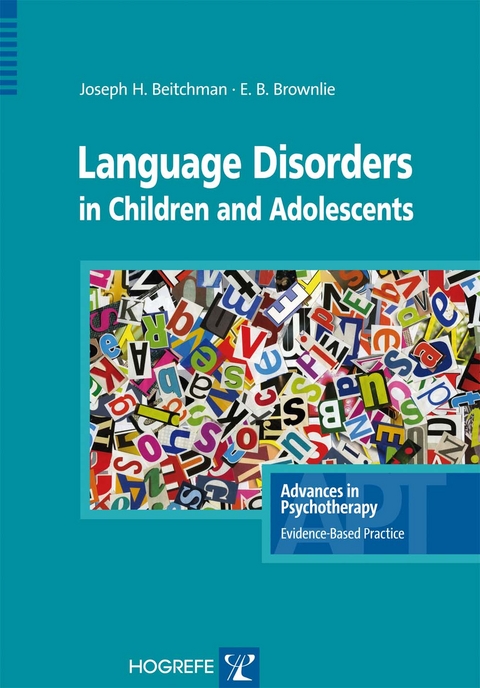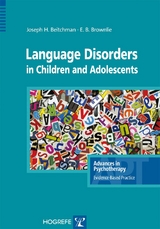Language Disorders in Children & Adolescents
Hogrefe Publishing (Verlag)
978-0-88937-338-9 (ISBN)
Diagnostic criteria of the DSM IV are discussed; alternative definitions and the proposed changes in DSM V and their implications are reviewed. The varied ways the language impaired child with a comorbid disorder comes to the attention of clinicians are described. This book provides the reader with an easy to follow plan on how to conduct the assessment with the child and parents, and the steps to take in initiating treatment - when to begin treatment focused on the language delays or, alternatively, when to focus on the comorbid conditions. The book is filled with many clinical pearls and examples of the way language impairment impacts on the child's symptom picture and influences treatment. Unique to this book are the recommended modifications to empirically validated treatments for language impaired children with comorbid anxiety or disruptive behavior disorders. Anyone who works with children and adolescents will benefit from this book.
Dr. Joseph Beitchman is a clinician and therapist who has been working with children and adolescents with language delays for more than 30 years. He has written extensively on language impairment and its relation to psychiatric disorders, including learning disabilities, anxiety disorders, and disruptive behavior disorders. He is Professor of Psychiatry at the University of Toronto where he teaches and does his research. Dr. Elizabeth Brownlie is a developmental psychologist who works in the area of child, youth, and emerging adult development. Her research focuses on the role of gender, language/learning, and other determinants of health on mental health and wellbeing. She is an Assistant Professor of Psychiatry at the University of Toronto.
Table of Contents
1 Description
1.1 Terminology
1.1.1 Terms for Language Difficulties
1.1.2 Diagnostic Criteria for Language Disorders
1.1.3 Alternative Classification Frameworks for
Language Impairment
1.1.4 Speech Disorders
1.1.5 Historical Terms
1.2. Definition
1.2.1 Language Domains
1.2.2 Late Language Emergence
1.2.3 Diagnostic Criteria: Language Impairment /
Language Disorders
1.2.4 Expressive Language Impairment
1.2.5 Receptive Language Impairment
1.2.6 Definitional Issues
1.2.7 Stigma, Labeling, and Terminology
1.3 Epidemiology
1.3.1 Sex Ratio, Cultural and Socioeconomic
Factors
1.4 Course and Prognosis
1.4.1 Early Childhood: Late Language Emergence
1.4.2 Child and Adolescent Development
1.4.3 Adult Outcomes
1.5 Differential Diagnosis
1.5.1 Developmental Delay / Intellectual
Disabilities / Mental Retardation
1.5.2 Environmental Deprivation
1.5.3 Autism Spectrum Disorder / Pervasive
Developmental Disorders
1.5.4 Selective Mutism
1.6 Comorbidities
1.6.1 Phonological Disorder
1.6.2 Learning Disabilities
1.6.3 Anxiety Disorders
1.6.4 Attention-Deficit/Hyperactivity Disorder
1.6.5 Conduct Disorders / Delinquency
1.6.6 Other Mental Health Concerns
1.7 Diagnostic and Procedures and Documentation
1.7.1 Language Screening
1.7.2 Language Assessment
1.7.3 Assessment Tools for Behavioral and
Emotional Concerns
2 Theories and Models of Language Disorders in Children
and Adolescents
2.1 Typical Language Development
2.1.1 Prenatal and Neonatal Development
2.1.2 Environmental Support for Language
Learning
2.1.3 Critical / Sensitive Periods
2.2. Language Impairment / Language Disorders
2.2.1 Genetics and Language Impairment
2.2.2 Information Processing and Working
Memory Limitations
2.2.3 Hearing Impairment and Otitis Media
2.2.4 Environmental Factors
2.3 Models Linking LI and Psychosocial Outcomes
2.3.1 Parent-–Child Relationship
2.3.2 Unrecognized Comprehension Problems
2.3.3 Self-Regulation
2.3.4 Social Problems
2.3.5 Academic Achievement Issues and
Competence
3 Diagnosis and Treatment Indications
3.1 Diagnostic Approach
3.2 Treatment Indications
3.2.1 Guidance
4 Treatment
4.1 Methods of Treatment
4.1.1 General Treatment Guidelines
4.1.2 Focus on Language]
4.1.3 Comorbid Language Disorders: Clarifying
the Issues
4.1.4 Organizing the Treatment
4.1.5 Core Therapeutic Approaches
4.1.6 Therapeutic Considerations for Adolescents
With LI
4.1.7 Social Skills Training Programs
4.2 Mechanisms of Action
4.2.1 Working With the Environment
4.2.2 Working With the Child
4.3 Efficacy and Prognosis
4.3.1 Anxiety Disorders
4.3.2 Disruptive Behavior Disorders: ADHD /
ODD / CD
4.4 Variations and Combinations of Methods
4.4.1 Use of Medication
4.5 Problems in Carrying Out the Treatments
4.5.1 Working With Parents
4.5.2 Addressing Pragmatic Issues
4.5.3 Therapist–Child Relationship
4.5.4 Resistance
4.6 Multicultural, Gender, and Social Disadvantage Issues
4.6.1 Gender Issues
4.6.2 Bilingual and Multilingual Children
4.6.3 Social Disadvantage
5 Further Reading
6 References
7 Appendix: Tools and Resources
| Reihe/Serie | Advances in Psychotherapy - Evidence-Based Practice ; 28 |
|---|---|
| Verlagsort | Toronto |
| Sprache | englisch |
| Maße | 178 x 254 mm |
| Themenwelt | Geisteswissenschaften ► Psychologie ► Entwicklungspsychologie |
| Medizin / Pharmazie ► Gesundheitsfachberufe ► Logopädie | |
| Medizin / Pharmazie ► Medizinische Fachgebiete ► Psychiatrie / Psychotherapie | |
| ISBN-10 | 0-88937-338-8 / 0889373388 |
| ISBN-13 | 978-0-88937-338-9 / 9780889373389 |
| Zustand | Neuware |
| Haben Sie eine Frage zum Produkt? |
aus dem Bereich




